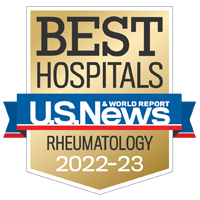
Reactive Arthritis
Reactive arthritis, formerly called Reiter's syndrome, typically occurs as a reaction to an infection in the body, usually the bowel or urogenital tract. Chlamydia trachomatis is the bacteria most commonly associated with reactive arthritis of the urogenital tract. Eating foods or substances contaminated by bacteria, such as salmonella, shigella, campylobacter and yersinia, can cause intestinal reactive arthritis. In many patients, the infection is not obvious.
Our Approach to Reactive Arthritis
UCSF provides comprehensive evaluations and advanced, personalized care for all forms of arthritis, including reactive arthritis. Depending on the individual case, a patient's treatment team may have several types of doctors, such as rheumatologists, dermatologists and urologists.
An underlying infection triggers reactive arthritis, so most patients are treated with antibiotics as well as pain relief medications.
Awards & recognition
-

Among the top hospitals in the nation
-

Best in California for rheumatology
UCSF Health medical specialists have reviewed this information. It is for educational purposes only and is not intended to replace the advice of your doctor or other health care provider. We encourage you to discuss any questions or concerns you may have with your provider.





